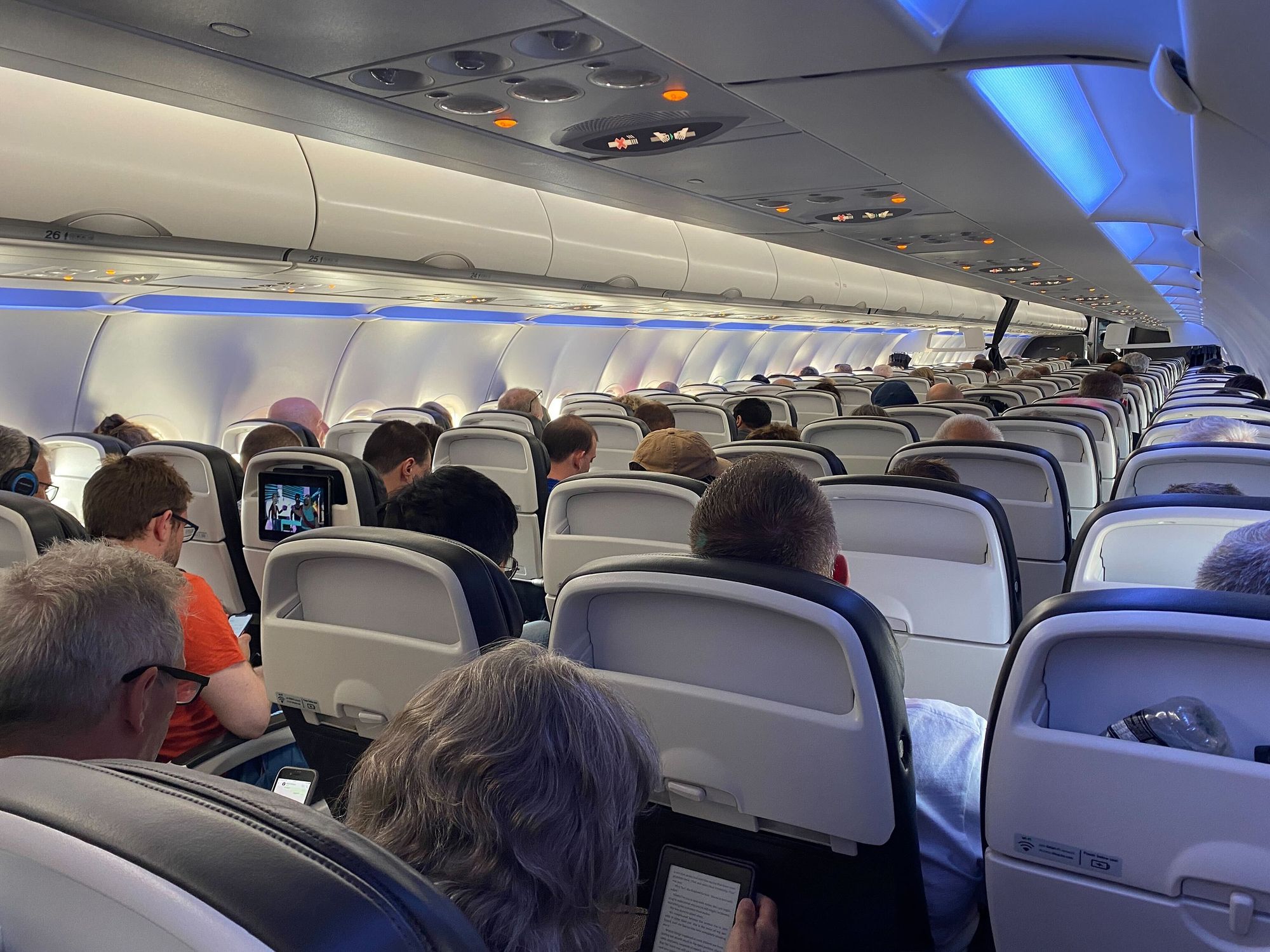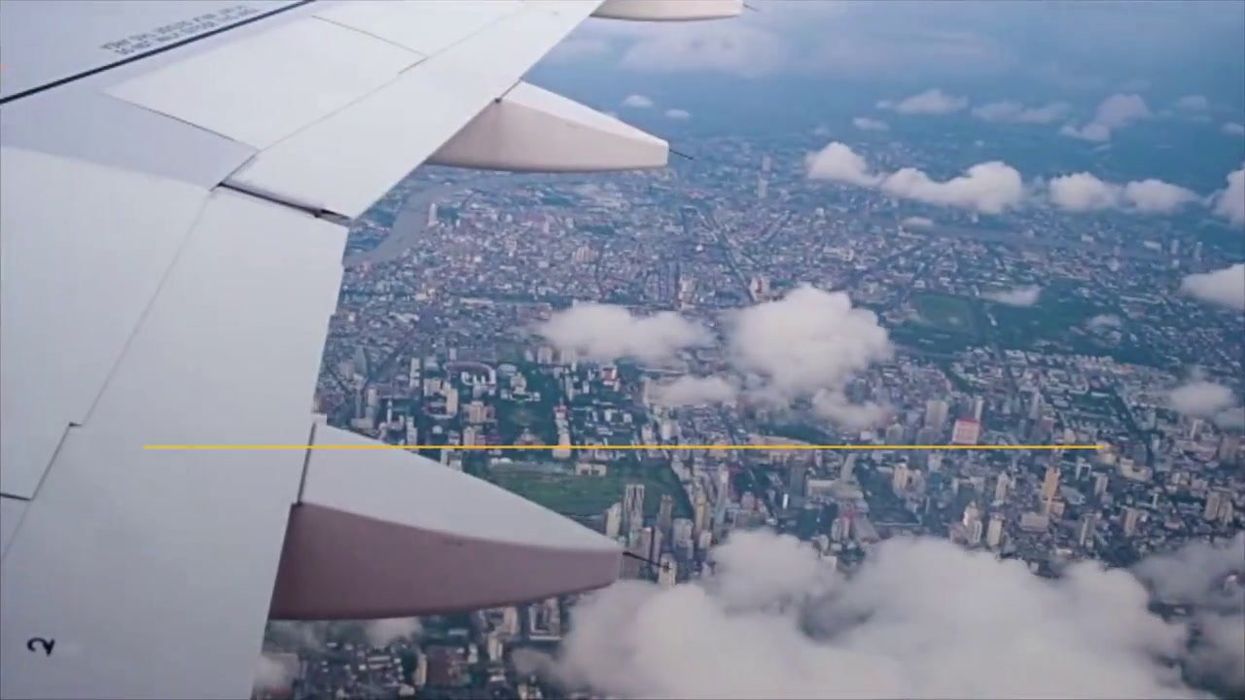Video
When it comes to going on holiday, there’s one place you’ll catch me in the airport: the bar. But unlike many, it’s not to celebrate the start of a week of relaxation - it’s to make the idea of stepping foot on a plane somewhat bearable.
Despite being a life-long traveller, I’ve had a lot of anxiety around flying for 10 years following a bad experience (storm, wind, darkness, I’ll spare the details). It’s yet to have stopped me travelling at all, but it takes a lot of Dutch courage, propranolol, and strategic planning to get there. My YouTube history is filled with videos of how to survive plane crashes (which in hindsight, doesn’t sound very medicinal), as well as clips of pilots advising the best seats to reserve in order to avoid the sharp jolts and strange noises you might encounter while on board.
However, unlike the isolating feeling you get with most fears, I know I’m not alone.
In fact, a fear of flying is the second most common phobia there is, and it’s estimated that between 30 and 40 per cent of us experience some of sort of anxiety about it.

British Airways is one of the only airlines in the UK that still offers a full day, in-person fear of flying course, and with a 95 per cent success rate, I was more than willing to give it a go.
It’s by no means a cheap option, with places on group sessions starting from £395. However, it would go a long way in changing someone’s life or ability to enjoy travel, and was a lot more than just being told: “stop being scared”.
It generally takes place at one of London’s major airports (I travelled to Heathrow), and sees the day split into two halves. The first would include talks with pilots, engineers, and psychologists validating the reasons why people are scared, and answering any burning questions we had about what could possibly go wrong while flying in a metal tube thousands of feet in the air (it turns out, not a lot). The second would be exposing ourselves to the thing we dreaded most: getting on a plane and trusting that we’d make it off alive.
Firstly, I was shocked by the number of people on the course. Anyone who’s scared of flying can often feel like they’re an inconvenience or embarrassed by the burden, but as it transpires, there’s a heck of a lot of us.
My course had around 120 participants, and there’s often a waiting list to get a spot.
@theindy100 Do you get the jitters when going on a plane? ✈️ It’s thought that around half the population experience some level of flight anxiety, so we went along to #BritishAirways’ Flying With Confidence course to see if we could end our travelling woes… #fearofflying #flying #pilot #plane #travel #BA #flyingwithconfidence #aerophobia #Flyingfear #planetok #fyp #foryou #trending ♬ original sound - Indy100
There was also a real mix of fear levels in the room. One person had taken a 17 hour train from across Europe to be there (to avoid the two hour flight), while others were monthly business travellers who simply couldn’t stomach the sleepless nights in the lead-up any longer.
One of the things I found most refreshing was that out of the many pilots, first officers, and cabin crew that teach on the course, they all do it completely voluntary. In fact, one of the first officers revealed that he had ended up in his role after he took the course himself 10 years ago, and found a new confidence that shaped his entire of his career.
So, what could’ve possibly sparked that change in him?
Well, to summarise: some of the most interesting things I learnt during the technical session are that a) A plane has one wing, not two, so no, they can’t snap off during any amount of turbulence, and b) An alarming ‘ding’ sound during your flight usually means the pilot wants a coffee.
On a more serious note, for someone who has major trust issues around the engineering of a plane (no offence to the people who work very hard making it one of the safest modes of transport), learning the physics behind why things work the way they do, and the legislation around aviation brought me a lot of comfort.

However, if you’re someone who believes a plane is safe but still can’t stand getting on one, the chances are, you’re in the claustrophobic percentage of nervous flyers.
The following session was dedicated to the psychology behind why we’re scared, and how to manage it. The bottom line is, whether you’re a safety skeptic, or don’t like being in an enclosed space, we quickly learnt there’s one thing that binds us all: not liking a lack-of control.
Suddenly, it all made sense.
People like me are desperate to have control of our own fate, while people with more claustrophobic tendencies often struggle with the lack-of escape route while in the air.
To combat the sense of impending doom all of us share while on board, a psychologist taught us a handy breathing technique known as ‘breathe and squeeze’. Instead of the traditional ‘breathe in through your nose and out through your mouth’, you want to start on an out breath, and as you breathe in, squeeze your bum cheeks together. It helps settle your adrenaline, apparently (or at least concentrates your mind on something else).
Following a break, which gave us the opportunity to chat with the pilots informally about their personal stories, it was time for the big one: getting 120 people who are terrified of flying on a plane.
We went through security and headed to the gate as any other passenger would. However, one thing was slightly different. We weren’t jetting off to blue skies, we’d be taking the only flight on the departure board where both the start and end destination was Heathrow.
Everyone still seemed surprisingly relaxed, but I did question if the lack-of screaming and crying was because many of us were used to masking it for so long from fear of embarrassment.
Out of more than 100 people, only two or three opted not to get on board. A positive start. I already felt an overwhelming sense of pride for everyone who had put years of anxiety on the line to get through the next hour.
One of the passengers I got chatting to hadn’t stepped foot on a plane for 25 years, which is almost the same amount of time I’ve been alive.
In terms of logistics, the flight was like any other, the only difference being that one of the captains took to the tannoy to feed us a step-by-step commentary of what was happening as engine noises fired up, as well as offer some moral support.
For 30 minutes we circled the skies surrounding the south of the UK, as everyone on board cheered each other on, and did our signature ‘breathe and squeeze’ in sync, as, for once, we admired the view below.
Perhaps it was the adrenaline, but I found myself strangely relaxed and felt like I’d regained some level of the control I’d been longing for using my new knowledge.
I’ll admit that when we landed, it was the only time I’ve ever found it acceptable for people to clap (I’ve since gone back to dramatically rolling my eyes).
Whether we’d enjoyed it or not, everyone appeared to beam with pride, and some even got excited about upcoming trips they were planning. Oh, and the person who hadn’t flown for 25 years? She even admitted it “wasn’t that bad”.
Could this be the end of the burden I’d carried for so long?
Fast-forward four weeks, and it was my first post-course flight.
I’ll admit, I still had my pre-plane jitters the night before. It’s what I’m used to, after all.
However, revising everything I’d learnt in my head, I rolled up to the airport and opted for water over wine, and spent time planning how I’d spend each hour of the flight.
One thing I noticed once we were in the air is how little I was bothered by things that used to bring me extreme stress.
Lights flickering? Oh that’s no bother, it’s just us changing from the airport’s electrical system to the plane’s. An ominous falling feeling on the way? Meh, that’s just part of the way our ears have evolved, even the pilots get it.
While I’m now still absolutely relieved when I reach my destination, I no longer find myself in fight or (literal) flight mode to getting there - and it’s slowly changing my travel experience for the better.
Sign up for our free Indy100 weekly newsletter
Have your say in our news democracy. Click the upvote icon at the top of the page to help raise this article through the indy100 rankings.



Leavitt distances White House from Noem 'domestic terrorism' comments